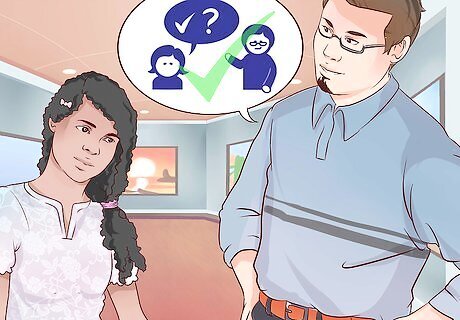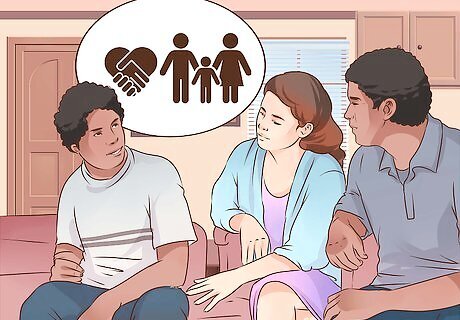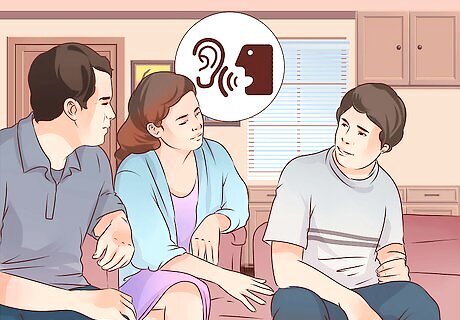
views
Setting Yourself Up for Success

Ask about your friend's parents. You wouldn't walk into a class you'd never taken on the first day and expect to pass a pop quiz, would you? No. This situation is no different. Learn anything and everything you can about your friend's parents. This especially applies to their careers and personal backgrounds. This is key to successfully engaging in conversation with them later.

Find common ground. Once you know a little about them, the rest is cake. If your friend's mom started a business, plan a way to ask her about it in the context of your own professional goals. Find ways to relate to your friend's dad's sports and hobbies. This tip will make conversation very easy later. With luck they'll do 3/4 of the talking! This is also key to making you seem relatable - the more of themselves they see in you, the more likely they are to like what they see!

Dress the part. This isn't saying to dress like its a job interview, but it is suggesting that you leave your FBI (Female Body Inspector) shirt at home. Be clean and presentable. Don't wear anything suggestive or provocative. If you choose to wear a scent, make sure that it is mild. Don't overdress, or they'll think that you are putting on a show for them. But definitely don't underdress. If in doubt, dress slightly up. Wear a button up (that could be unbuttoned) when a polo would have done. Wear a polo when a tee shirt would have been acceptable.
Making a Good First Impression

Make eye contact. Proper eye contact is key to establishing a connection and rapport between people. Breaking eye contact or nervously looking away can be seen as having something to hide or lying. Don't lock eyes for too long though. Maintaining overly long eye contact is usually regarded as being either sexual or confrontational.

Address them properly. Use "Sir", "Ma'am", and "Mr./Mrs. +Lastname". While they may instruct you to address them by their first name, don't take this for granted. Unless they give you permission you should always address them with proper deference. Even if they give you permission to use their first name, consider mostly using the standard proper terms. Correcting yourself by starting to say Sir or Ma'am and then using their first name is a good way to endear yourself to them. "Sir- excuse me, I mean John..." etc.

Engage in appropriate physical contact. Shake hands and give hugs when appropriate. Don't be overly touchy with either your friend or their parents, but avoiding contact altogether will make it appear as if you are unsure of yourself and uncomfortable.

Follow common courtesy. "Please", "Thank you", and "I'm well, thanks, how are you?", go a long way, and are a lost art. Hold doors, excuse yourself, and defer when appropriate. Remove your hat when entering the house, and remove your shoes as well if your hosts do. If you are complimented on your good manners, score even more points by giving credit to your parents or authority figures for raising you properly. If you are unsure of what to do (for example, whether to remove shoes or not), simply ask! They'll see you as conscientious and thoughtful.
Standing Out

Maintain proper posture. This seems simple, but really isn't. Sit up, don't slouch. Watch out for crossing your arms, as this can make you appear standoffish or defensive. A proper, inviting posture will ensure that your friend's parents feel like they can connect with you.

Engage in conversation. This is where your homework comes into play. Knowing your friend's parent's backgrounds and interest can be crucial at this point. Ask them about their careers and interests. Try to draw parallels to your own, if possible. You have several objectives when engaging in conversation. You want to distinguish yourself in a positive way from most other people your age. You will work to establish common ground with your friend's parents. You'll allow your friend's parents to do most of the talking - they'll like it and it makes your job easier!

Talk about yourself in a humble way. While you should avoid "humblebragging" this doesn't mean you shouldn't talk about yourself in a genuine way . Show that you are confident in yourself by being unafraid to talk about your interests, goals, and accomplishments. Your friend's parents are probably very interested in learning more about you. You are friends with the most important person in the world to them!
Proving Yourself

Highlight common interests. Your friend's parents will be wondering what makes you and your friend close. Don't be afraid to show them (provided that it is positive). Talking about a shared love of sports or music is good. They want to know that the two of you connect in a healthy and meaningful way.

Be a good influence. This is especially true of friends in their childhood and teen years. Parents of children and teens are always worried that their child's friends are going to be a bad influence, but good influences are very valuable. Demonstrate responsibility and an awareness of long term concerns beyond immediate gratification.

Show that you meet your friend's needs. While this is true of all friends, this is especially true of potential romantic partners. Your friend's parent's want to see their child's potential partner as someone who helps and complements their child, bringing out the best in him or her.

Demonstrate that you care for your friend. This is the simplest of things, and if you truly are friends it shouldn't be hard at all. Demonstrate that you care about your friend's feelings. Defer to your friend if necessary and give your friend's parents a way to see that you have your friend's best at heart. Talk about how you met, or what makes your friend stand out. Bring up the future, and discuss plans that you and your friend are trying to make.




















Comments
0 comment